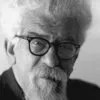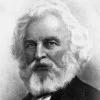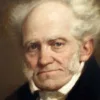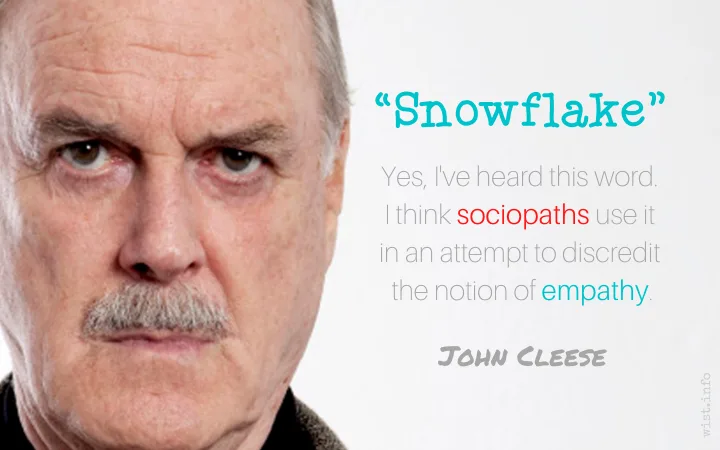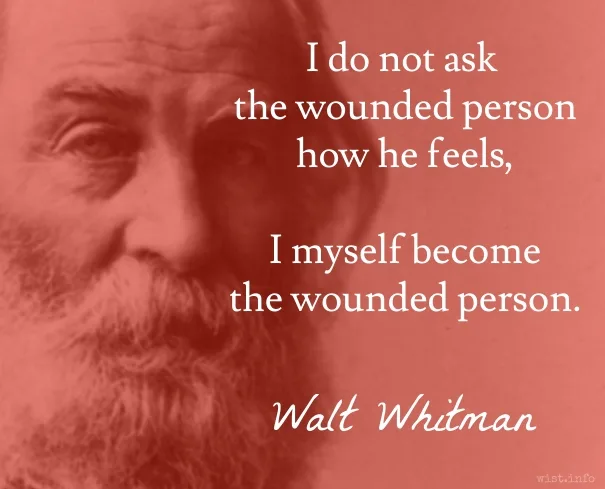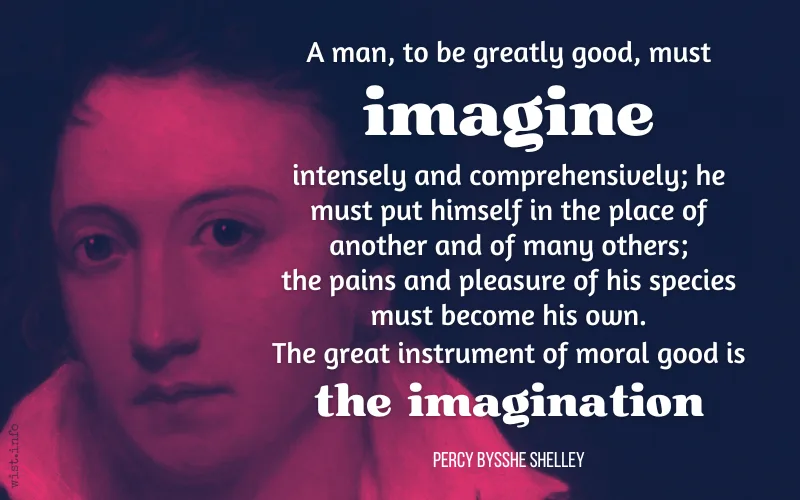It is easy to tell the toiler
How best he can carry his pack,
But no one can rate a burden’s weight
Until it has been on his back.Ella Wheeler Wilcox (1850-1919) American author, poet, temperance advocate, spiritualist
Poem (1896), “Preaching vs. Practice,” st. 4, Custer and Other Poems
(Source)
Quotations about:
empathy
Note not all quotations have been tagged, so Search may find additional quotes on this topic.
If you cannot or will not imagine the results of your actions, there’s no way you can act morally or responsibly. Little kids can’t do it; babies are morally monsters—completely greedy. Their imagination has to be trained into foresight and empathy.
Ursula K. Le Guin (1929-2018) American writer
Interview (2005-12-17), “The Magician,” by Maya Jaggi, The Guardian
(Source)
ADRIANA: A wretched soul bruised with adversity
We bid be quiet when we hear it cry,
But were we burdened with like weight of pain,
As much or more we should ourselves complain.William Shakespeare (1564-1616) English dramatist and poet
Comedy of Errors, Act 2, sc. 1, l. 34ff (2.1.34-37) (1594)
(Source)
Piglet took Pooh’s arm, in case Pooh was frightened.
A. A. Milne (1882-1956) English poet and playwright [Alan Alexander Milne]
House at Pooh Corner, ch. 4 “Tiggers Don’t Climb Trees” (1928)
(Source)
I don’t know ov a better kure for sorrow than tew pity sum boddy else.
[I don’t know of a better cure for sorrow than to pity somebody else.]
But one cannot weep for the entire world. It is beyond human strength. One must choose.
[On ne peut pleurer pour le monde entier : C’est au-delà des forces humaines. Il faut choisir!]
Jean Anouilh (1910-1987) French dramatist
Cecile; or The School for Fathers [L’Ecole Des Peres] [The Chevalier] (1951) [tr. Klein (1956)]
(Source)
I have known sorrow — therefore I
May laugh with you, O friend, more merrily
Than those who never sorrowed upon earth
And know not laughter’s worth.I have known laughter — therefore I
May sorrow with you far more tenderly
Than those who never guess how sad a thing
Seems merriment to one heart’s suffering.Theodosia Pickering Garrison (1874-1944) American poet
“Knowledge,” The Century Magazine (1900-08)
(Source)
Adept Kung said: “I do nothing to others that I wouldn’t want done to me.”
“That’s something you haven’t quite mastered, Kung,” the Master replied.
[子貢曰、我不欲人之加諸我也、吾亦欲無加諸人。
子曰、賜也、非爾所及也。]Confucius (c. 551- c. 479 BC) Chinese philosopher, sage, politician [孔夫子 (Kǒng Fūzǐ, K'ung Fu-tzu, K'ung Fu Tse), 孔子 (Kǒngzǐ, Chungni), 孔丘 (Kǒng Qiū, K'ung Ch'iu)]
The Analects [論語, 论语, Lúnyǔ], Book 5, verse 12 (5.12) (6th C. BC – AD 3rd C.) [tr. Hinton (1998)]
(Source)
The earliest appearance of the "Golden Rule" in world literature. See also 12.2, 15.24, and Matthew 7:12.
Originally numbered 5.11 by Legge and other early sources, as noted.
(Source (Chinese)). Alternate translations:Tsze-kung said, "What I do not wish men to do to me, I also wish not to do to men."
The Master said, "Ts'ze, you have not attained to that."
[tr. Legge (1861), 5.11]Tsz-kung made the remark: ‘That which I do not wish others to put upon me, I also wish not to put upon others.’
‘Nay,’ said the Master, 'you have not got so far as that.’
[tr. Jennings (1895), 5.11]A disciple said to Confucius, "What I do not wish that others should not do unto me, I also do not wish that I should do unto them."
"My friend," answered Confucius, "You have not yet attained to that."
[tr. Ku Hung-Ming (1898), 5.11]Tzŭ Kung said, "What I do not wish others to do to me, that also I wish not to do to them."
"Tzŭ!" observed the Master, "that is a point to which you have not attained."
[tr. Soothill (1910), 5.11]Tze-Kung said: What I don't want done to me, 1 don’t want to do to anyone else.
Confucius said: No, Ts'ze. you haven't got that far yet.
[tr. Pound (1933), 5.11]Tzu-kung said, What I do not want others to do to me, I have no desire to do to others.
The Master said, Oh Ssu! You have not quite got to that point yet.
[tr. Waley (1938), 5.11]Tuan-mu Tz'u said, "What I do not wish others to do unto me I also wish not to do unto others."
"You're not up to that!"
[tr. Ware (1950)]Tzu-kung said, "While I do not wish others to impose on me, I also wish not to impose on others."
The Master said, "Ssu, that is quite beyond you."
[tr. Lau (1979)]Zigong said: "If I do not want others to inflict something on me, I also want to avoid inflicting it on others."
The Master said: "Si, this is not a point you have yet reached."
[tr. Dawson (1993)]Zigong said: "I would not want to do to others what I do not want them to do to me."
The Master said: "Oh, you have not come that far yet!"
[tr. Leys (1997)]Zi-gong said: "What I do not wish others to impose on me, I also do not wish to impose on others."
The Master said: "Ci, this is beyond your reach."
[tr. Huang (1997)]Zigong said: "I do not want others to force anything on me, and I do not want to force anything on others, too."
Confucius said: "Si, it could not be reached by you."
[tr. Cai/Yu (1998), #104]Dž-gùng said, If I do not wish others to do something to me, I wish not to do it to them.
The Master said, Sz', this is not what you can come up to.
[tr. Brooks/Brooks (1998)]>Zigong said, "I do not want others to impose on me, nor do I want to impose on them."
Confucius replied, "Zigong, this is quite beyond your reach."
[tr. Ames/Rosemont (1998)]Zigong said, “What I do not wish others to do unto me, I also wish not to do unto others.”
The Master said, “Ah, Zigong! That is something quite beyond you.”
[tr. Slingerland (2003)]Zigong said, What I don’t want others to do to me, I want to avoid doing to others.
The Master said, Si (Zigong), you haven’t gotten to that stage yet.
[tr. Watson (2007)]Zigong said, "I do not wish others to impose what is unreasonable [jia] on me, and I do also not wish to impose what is unreasonable on others."
The Master said, "Si [Zigong], this is not something that is within your power."
[tr. Chin (2014)]Zi Gong said, "I hope other people will not impose on me against my will. Likewise, I will not impose on other people against their will too."
Confucius said, "Ci, you may not be able to do so all the time."
[tr. Li (2020)]
The love of our neighbor in all its fullness simply means being able to say to him: “What are you going through?” It is a recognition that the sufferer exists, not only as a unit in a collection, or a specimen from the social category labelled “unfortunate,” but as a man, exactly as we are, who was one day stamped with a special mark by affliction.
Simone Weil (1909-1943) French philosopher
“Studies with a View to the Love of God” (Apr 1942), Waiting for God [Awaiting God; Attente De Dieu] (1950)
(Source)
The idea of compassion has become unfashionable. It’s gotten confused with sentimentality, though you English majors know the difference: sentimentality is emotion without responsibility; compassion is the recognition of shared humanity. Chalk and cheese. Sentimentality is superficial, easy listening that does nothing to expand our understanding. Compassion is quite different. Risky and exigent, it puts you inside someone else. This is one of literature’s greatest strengths
Roxana Robinson (b. 1946) American novelist and biographer
“The Writer’s Life,” Authors Guild Bulletin (Winter 2015)
(Source)
A religious man is a person who holds God and man in one thought at one time, at all times, who suffers in himself harm done to others, whose greatest passion is compassion, whose greatest strength is love and defiance of despair.
Abraham Joshua Heschel (1907-1972) Polish-American rabbi, theologian, philosopher
“What Ecumenism Is” (1963)
(Source)
Collected in Susanna Heschel, ed., Moral Grandeur and Spiritual Audacity (1996). In other essays in the book, he uses the first clause ("a person who holds God and man in one thought, at one time, at all times") as a definition of a "prophet."
Democratic citizenship requires a degree of empathy, insight, and kindness that demands a great deal of all of us. There are easier ways to live.
Jason Stanley (b. 1969) American philosopher, epistemologist, academic
How Fascism Works: The Politics of Us and Them, ch. 10 (2018)
(Source)
Reason was an ambiguous tool, because, as we have seen throughout history, it can be used to find a logically sound rationale for actions that violate our humanity. […] If it is not tempered by compassion, and empathy, reason can lead men and women into a moral void.
Karen Armstrong (b. 1944) British author, comparative religion scholar
Twelve Steps To a Compassionate Life, “Empathy” (2010)
(Source)
The hardest lesson — and this is what child-rearing and perhaps all of manners is about — is that there are other people in the world and you do have to take their feelings into consideration. It doesn’t mean you always have to yield to them, but it does mean that you have to know how to deal with them. A lot of people know that they want to be treated politely, but they don’t make that little leap and say, Well, the other person must feel that way, too.
Judith Martin (b. 1938) American author, journalist, etiquette expert [a.k.a. Miss Manners]
In “Polite Company,” interview by Hara Estroff Marano, Psychology Today (1998-03)
(Source)
The happy should not insist too much upon their happiness in the presence of the unhappy.
Pity is aroused by unmerited misfortune, fear by the misfortune of a man like ourselves.
[ἔλεος μὲν περὶ τὸν ἀνάξιον, φόβος δὲ περὶ τὸν ὅμοιον]
Aristotle (384-322 BC) Greek philosopher
Poetics [Περὶ ποιητικῆς, De Poetica], ch. 13 / 1453a (c. 335 BC) [tr. Butcher (1895)]
(Source)
On the essential elements of tragedy. Original Greek. Alternate translations:
- "Pity is occasioned by undeserved misfortune, and fear by that of one like ourselves." [tr. Bywater (1909)]
- "Pity is concerned with unmerited ill-fortune, fear with what happens to one's like." [tr. Margoliouth (1911)]
- "Pity for the undeserved misfortune, fear for the man like ourselves." [tr. Fyfe (1932)]
- "We pity those who suffer undeservedly, and feel fear for people who are like ourselves." [tr. Janko (1987)]
- "The one [pity] is to do with the man brought to disaster undeservedly, the other [terror] is to do with [what happens to] men like us." [tr. Whalley (1997)]
- "One of these sentiments, namely pity, has to do with undeserved misfortune, and the other, namely fear, has to do with someone who is like ourselves." [tr. Sachs (2006)]
A friend is one who rejoices in our good and grieves for our pain, and this purely on our own account.
[τούτων δὲ ὑποκειμένων ἀνάγκη φίλον εἶναι τὸν συνηδόμενον τοῖς ἀγαθοῖς καὶ συναλγοῦντα τοῖς λυπηροῖς μὴ διά τι ἕτερον ἀλλὰ δι᾽ ἐκεῖνον.]
Aristotle (384-322 BC) Greek philosopher
Rhetoric [Ῥητορική; Ars Rhetorica], Book 2, ch. 4, sec. 3 (2.4.3) / 1381a (350 BC) [tr. Jebb (1873)]
(Source)
(Source (Greek)). Alternate translations:
- "He who rejoices with one in prosperity, and sympathises with one in pain, not with a view to anything else but for his friend's sake, is a friend." [Source (1847)]
- "One who participates in another's joy at good fortune, and in his sorry at what aggrieves him, not from any other motive, but simply for his sake, is his friend." [tr. Buckley (1850)]
- "Your friend is the sort of man who shares your pleasure in what is good and your pain in what is unpleasant, for your sake and for no other reason." [tr. Roberts (1924)]
- "He is a friend who shares our joy in good fortune and our sorrow in affliction, for our own sake and not for any other reason." [tr. Freese (1926)]
- "The following people are our friends: those who share our pleasure when good things happen and our distress when bad things happen for no other reason than for our sake." [tr. Waterfield (2018)]
- "A friend is one who shares in the other fellow's pleasure at the good things and his pain at what is grievous, for no other reason than that fellow's sake." [tr. Bartlett (2019)]
- "A friend is someone who is a partner in our happiness and a partner in our sorrow not for any other reason but for friendship." [tr. @sentantiq (2019)]
It can be very dangerous to see things from somebody else’s point of view without the proper training.
Douglas Adams (1952-2001) English author, humourist, screenwriter
Mostly Harmless, ch. 15 (1992)
(Source)
The one and only test of a valid religious idea, doctrinal statement, spiritual experience, or devotional practice was that it must lead directly to practical compassion. If your understanding of the divine made you kinder, more empathetic, and impelled you to express this sympathy in concrete acts of loving-kindness, this was good theology. But if your notion of God made you unkind, belligerent, cruel, or self-righteous, or if it led you to kill in God’s name, it was bad theology. Compassion was the litmus test for the prophets of Israel, for the rabbis of the Talmud, for Jesus, for Paul, and for Muhammad, not to mention Confucius, Lao-tsu, the Buddha, or the sages of the Upanishads.
Karen Armstrong (b. 1944) British author, comparative religion scholar
The Spiral Staircase: My Climb Out of Darkness (2004)
(Source)
What makes people hard-hearted is this, that each man has, or thinks he has, as much as he can bear in his own troubles.
[Was die Menschen hartherzig macht, is Dieses, daß jeder an seinen eigenen Plagen genug zu tragen hat, oder doch es meint.]
Arthur Schopenhauer (1788-1860) German philosopher
Parerga and Paralipomena, Vol. 2, ch. 26 “Psychological Observations [Psychologische Bemerkungen],” § 325 (1851) [tr. Saunders (1890)]
(Source)
(Source (German)). Alternate translation:What makes a man hard-hearted is this, that each man has, or fancies he has, sufficient in his own troubles to bear.
[tr. Dircks]
“Snowflake.” Yes, I’ve heard this word. I think sociopaths use it in an attempt to discredit the notion of empathy.
It is by means of my vices that I understand yours.
Ralph Waldo Emerson (1803-1882) American essayist, lecturer, poet
Journal (1844, Spring-Summer)
(Source)
He recorded this phrase multiple times, including in his lecture, "The Anglo-American" (7 Dec 1852), and Notebook S Salvage.
Manners are a sensitive awareness of the feelings of others. If you have that awareness, you have good manners, no matter what fork you use.
Emily Post (1872-1960) American author, columnist [née Price]
(Attributed)
Often cited to her famous Etiquette in Society, in Business, in Politics, and at Home (1922), but not found in that work. Claimed as genuine by the Emily Post Institute.
Your Honor, years ago I recognized my kinship with all living beings, and I made up my mind then that I was not one bit better than the meanest on earth. I said then, and I say now, that while there is a lower class, I am in it; and while there is a criminal element, I am of it; and while there is a soul in prison, I am not free.
Eugene V. Debs (1855-1926) American union leader, activist, socialist, politician
Statement to the Court (1918-09-18)
(Source)
On being convicted of sedition for urging resistance to the draft. Often paraphrased:As long as there is a lower class, I am in it. As long as there is a criminal element, I am of it. As long as there is a soul in prison, I am not free.
The moral of it is, that if we would build on a sure foundation in friendship, we must love our friends for THEIR sakes rather than OUR OWN; we must look at their truth to THEMSELVES, full as much as their truth to US. In the latter case, every wound to self-love would be a cause of coldness; in the former, only some painful change in the friend’s character and disposition — some frightful breach in his allegiance to his better self — could alienate the heart.
Charlotte Brontë (1816-1855) British novelist [pseud. Currer Bell]
Letter to W S. Williams (21 Jul 1851)
(Source)
I do not ask the wounded person how he feels, I myself become the wounded person.
You must look into people, as well as at them. Almost all people are born with all the passions, to a certain degree; but almost every man has one prevailing one, to which the others are subordinate. Search every one for that ruling passion; pry into the recesses of his heart, and observe the different workings of the same passion in different people; and when you have found out the prevailing passion of any man, remember never to trust him where that passion is concerned. Work upon him by it, if you please; but be upon your guard yourself against it, whatever professions he may make you.
Lord Chesterfield (1694-1773) English statesman, wit [Philip Dormer Stanhope]
Letter to his son, #112 (4 Oct 1746)
(Source)
Rejoice with them that do rejoice, and weep with them that weep.
The Bible (The New Testament) (AD 1st - 2nd C) Christian sacred scripture
Romans 12:15 [KJV]
Quoting 12:15-18: "Rejoice with those who rejoice, and weep with those who weep. Be of the same mind toward one another; do not be haughty in mind, but associate with the lowly Do not be wise in your own estimation. Never pay back evil for evil to anyone Respect what is right in the sight of all men. If possible, so far as it depends on you, be at peace with all men."
The more you are drawn to put yourself in the place of the other person, the more you feel the pain inflicted upon him, the insult offered him, the injustice of which he is a victim, the more you will be urged to act so that you may prevent the pain, insult, or injustice.
Now, I’m an atheist. I really don’t believe for a moment that our moral sense comes from a God. […] It’s human, universal, [it’s] being able to think our way into the minds of others. As I said at the time, what those holy fools clearly lacked, or clearly were able to deny themselves, was the ability to enter into the minds of the people they were being so cruel to. Amongst their crimes, is, was, a failure of the imagination, of the moral imagination.
We have a marvelous gift, and you see it develop in children, this ability to become aware that other people have minds just like your own and feelings that are just as important as your own, and this gift of empathy seems to me to be the building block of our moral system.
Yet, taught by time, my heart has learned to glow
For other’s good, and melt at other’s woe.
Imagining what it is like to be someone other than yourself is at the core of our humanity. It is the essence of compassion, and it is the beginning of morality.
Ian McEwan (b. 1948) English novelist and screenwriter
“Only love and then oblivion,” The Guardian (15 Sep 2001)
(Source)
There is nothing we like to see so much as the gleam of pleasure in a person’s eye when he feels that we have sympathized with him, understood him, interested ourself in his welfare. At these moments something fine and spiritual passes between two friends. These moments are the moments worth living.
When we honestly ask ourselves which person in our lives mean the most to us, we often find that it is those who, instead of giving advice, solutions, or cures, have chosen rather to share our pain and touch our wounds with a warm and tender hand. The friend who can be silent with us in a moment of despair or confusion, who can stay with us in an hour of grief and bereavement, who can tolerate not knowing, not curing, not healing and face with us the reality of our powerlessness, that is a friend who cares.
A man, to be greatly good, must imagine intensely and comprehensively; he must put himself in the place of another and of many others; the pains and pleasure of his species must become his own. The great instrument of moral good is the imagination; and poetry administers to the effect by acting upon the cause.
I do not believe that any man can lead who does not act, whether it be consciously or unconsciously, under the impulse of a profound sympathy with those whom he leads — a sympathy which is insight — an insight which is of the heart rather than of the intellect.
Woodrow Wilson (1856-1924) US President (1913-20), educator, political scientist
“Leaders of Men,” Commencement Address, University of Tennessee, Knoxville (17 Jun 1890)
(Source)
None knowes the weight of anothers burthen.
George Herbert (1593-1633) Welsh priest, orator, poet.
Jacula Prudentum, or Outlandish Proverbs, Sentences, &c. (compiler), # 880 (1651 ed.)
(Source)
If you ask any police officer what the worst part of the job is, they will always say breaking bad news to relatives, but this is not the truth. The worst part is staying in the room after you’ve broken the news, so that you’re forced to be there when someone’s life disintegrates around them. Some people say it doesn’t bother them — such people are not to be trusted.
The pat on the back, the arm around the shoulder, the praise for what was done right, and the sympathetic nod for what wasn’t, are as much a part of golf as life itself.
He whose Belly is full, believes not him whose is empty.
Thomas Fuller (1654-1734) English physician, preacher, aphorist, writer
Gnomologia: Adages and Proverbs (compiler), # 2399 (1732)
(Source)
ORLANDO: But, O, how bitter a thing it is to look into happiness through another man’s eyes!
William Shakespeare (1564-1616) English dramatist and poet
As You Like It, Act 5, sc. 2, l. 45ff (5.2.45) (1599)
(Source)
You can’t do the biggest things in this world unless you handle men; and you can’t handle men if you’re not in sympathy with them; and sympathy begins in humility.
George Horace Lorimer (1867-1937) American journalist, author, magazine editor
Old Gorgon Graham: More Letters from a Self-Made Merchant to His Son, ch. 12 (1903)
(Source)
Shared joyse are doubled; shared sorrows are halved.
Zigong asked, Is there a single word that can guide a person’s conduct throughout life?
The Master said, That would be reciprocity, wouldn’t it? What you do not want others to do to you, do not do to others.[子貢問曰、有一言、而可以終身行之者乎。
子曰、其恕乎、己所不欲、勿施於人。]Confucius (c. 551- c. 479 BC) Chinese philosopher, sage, politician [孔夫子 (Kǒng Fūzǐ, K'ung Fu-tzu, K'ung Fu Tse), 孔子 (Kǒngzǐ, Chungni), 孔丘 (Kǒng Qiū, K'ung Ch'iu)]
The Analects [論語, 论语, Lúnyǔ], Book 15, verse 24 (15.24) (6th C. BC – AD 3rd C.) [tr. Watson (2007)]
(Source)
See also 5.12. Compare to the Bible, Matthew 7:12.
Legge and other earlier translators, as noted below, identified this as 15.23.
(Source (Chinese)). Alternate translations:Tsze-kung asked, saying, "Is there one word which may serve as a rule of practice for all one's life?"
The Master said, "Is not RECIPROCITY such a word? What you do not want done to yourself, do not do to others."
[tr. Legge (1861), 15.23]Tsz-kung put to him the question, "Is there one word upon which the whole life may proceed?" The Master replied, "Is not RECIPROCITY such a word? -- what you do not yourself desire, do not put before others."
[tr. Jennings (1895), 15.23. Jennings prefers translating shu as "like-heartedness" or "like-mindedness," but follows Legge.]A disciple of Confucius enquired: "Is there one word which may guide one in practice throughout the whole life?"
Confucius answered, "The word 'charity' is perhaps the word. What you do not wish others to do unto you, do not do unto them."
[tr. Ku Hung-Ming (1898), 15.23]"Is there any one word," asked Tzŭ Kung, "which could be adopted as a lifelong rule of conduct?"
The Master replied, "Is not Sympathy the word? Do not do to others what you would not like yourself."
[tr. Soothill (1910), 15.23; he translates shu in the notes as "the following of your good heart's prompting."]Tze-kung asked if there were a single verb that you could practice through life up to the end.
He said: Sympathy, what you don't want (done to) yourself, don't inflict on another.
[tr. Pound (1933), 15.23]Tzu-kung asked saying, Is there any single saying that one can act upon all day and every day?
The Master said, Perhaps the saying about consideration: "Never do to others what you would not like them to do to you."
[tr. Waley (1938), 15.23]Tsekung asked, :Is there one single word that can serve as a principle or conduct for life?"
Confucius replied, "Perhaps the word "reciprocity" (shu) will do. Do not do unto others what you do not want others to do unto you."
[tr. Lin Yutang (1938); see also here and here.]Tuan-mu Tz’u inquired, “Is there one word that will keep us on the path to the end of our days?”
“Yes. Reciprocity! What you do not wish yourself, do not unto others.”
[tr. Ware (1950)]Tzu-kung asked, "Is there a single word which can be a guide to conduct throughout one's life?"
The Master said, "It is perhaps the word "shu." Do not impose on others what you yourself do not desire.
[tr. Lau (1979)]Zigong asked: "Is there a single word such that one could practise it throughout one's life?"
The Master said: "Reciprocity perhaps? Do not inflict on others what you yourself would not wish done to you."
[tr. Dawson (1993)]Zigong asked: "Is there any single word that could guide one's entire life?"
The Master said: "Should it not be reciprocity? What you do not wish for yourself, do not do to others."
[tr. Leys (1997)]Zi-gong asked: “Is there one single word that one can practice throughout one’s life?”
The Master said: “It is perhaps ‘like-hearted considerateness.’ 'What you do not wish for yourself, do not impose on others.'"
[tr. Huang (1997)]Zi-gong asked: "Is there one single word that one can practice throughout one's life?"
The Master said: "It is perhaps 'like-hearted considerateness.' 'What you do not wish for yourself, do not impose on others.'"
[tr. Huang (1997)]Zigong asked, "Is there a word that can be practiced in all life?"
Confucius said: "It is the forgiveness. What is not wanted by oneself, should not be forced to others."
[tr. Cai/Yu (1998)]Zigong asked, "Is there one expression that can be acted upon until the end of one's days?"
The Master replied "There is shu: do not impose on others what you yourself do not want."
[tr. Ames/Rosemont (1998)]Dž-gùng asked, is there one saying that one can put in practice in all circumstances?
The Master said, That would be empathy, would it not? What he himself does not want, let him not do it to others.
[tr. Brooks/Brooks (1998)]Adept Kung asked: "Is there any one word that could guide a person throughout life?"
The Master replied, "How about "shu": never impose on others what you would not choose for yourself.
[tr. Hinton (1998)]Zigong asked, “Is there one word that can serve as a guide for one’s entire life?”
The Master answered, “Is it not ‘understanding’ ? Do not impose upon others what you yourself do not desire.”
[tr. Slingerland (2003)]Zigong asked: "Is there a single word that can serve as the guide to conduct throughout one's life?"
The Master said, "It is perhaps the word shu. Do not impose on others what you yourself do not want."
[tr. Chin (2014); Chin translates shu as "treating others with an awareness that they, too, are alive with humanity"]
Therefore all things whatsoever ye would that men should do to you, do ye even so to them: for this is the law and the prophets.
The Bible (The New Testament) (AD 1st - 2nd C) Christian sacred scripture
Matthew 7:12 (KJV)
Variants:
- Popularly, "Do unto others as you would have them do unto you."
- NIV: "So in everything, do to others what you would have them do to you, for this sums up the Law and the Prophets."
- NRSV: "In everything do to others as you would have them do to you; for this is the law and the prophets."
- TEV: "Do for others what you want them to do for you: this is the meaning of the Law of Moses and of the teachings of the prophets."
Note: The "Golden Rule" has been expressed in many ways by many religious and philosophical teachers. Several of these in WIST are or will be cross-referenced to this quotation (as trackbacks), not to lend it primacy, but because this is the most well-known formulation of it in the Western world, and to simplify the cross-referencing to one central point.
I have almost reached the regrettable conclusion that the Negro’s great stumbling block in his stride toward freedom is not the White Citizen’s Counciler or the Ku Klux Klanner, but the white moderate, who is more devoted to “order” than to justice; who prefers a negative peace which is the absence of tension to a positive peace which is the presence of justice; who constantly says: “I agree with you in the goal you seek, but I cannot agree with your methods of direct action”; who paternalistically believes he can set the timetable for another man’s freedom; who lives by a mythical concept of time and who constantly advises the Negro to wait for a “more convenient season.” Shallow understanding from people of good will is more frustrating than absolute misunderstanding from people of ill will.
Martin Luther King, Jr. (1929-1968) American clergyman, civil rights leader, social activist, preacher
Letter from Birmingham Jail (16 Apr 1963)
(Source)
What is hateful to you, do not to your neighbor. That is the whole Torah; the rest is commentary. Go and study it.
[d’`alakh sani l’khaverkha la ta`avid. Zo hi kol hatora kulahh, v’idakh peirusha hu: zil g’mor]
The Talmud (AD 200-500) Collection of Jewish rabbinical writings
Babylonian Talmud, Shabbat 31a (Rabbi Hillel)
(Noted elsewhere as tractate Shabbat 30a.) See also the Bible, Matthew 7:12.Alt. Trans.: "What is hateful to thee, do not unto thy fellow; this is the whole law. All the rest is a commentary to this law; go and learn it."
Candy smiled at me a little. “Look,” she said. “You’re a good guy. I know you care about me, but you’re a white male, you can’t understand a minority situation. It’s not your fault.”
[…] When the beer came, I drank about a quarter of it and said to Candy, “Extend that logic, and we eventually have to decide that no one can understand anyone. Maybe the matter of understanding has been overrated. Maybe I don’t have to understand your situation to sympathize with it, to help you alter it, to be on your side. I’ve never experienced starvation either, but I’m opposed to it. When I encounter it, I try to alleviate it. I sympathize with its victims. The question of whether I understand it doesn’t arise.”
She shook her head. “That’s different,” she said.
“Maybe it isn’t. Maybe civilization is possible, if at all, only because people can care about conditions they haven’t experienced. Maybe you need understanding like a fish needs a bicycle.”
“You’re quite thoughtful,” she said, “for a man your size.”
“You’ve never been my size,” I said. “You wouldn’t understand.”
Those who do not feel pain seldom think that it is felt.
Samuel Johnson (1709-1784) English writer, lexicographer, critic
The Rambler, #48 (1 Sep 1750)
(Source)
Human beings are like parts of a body,
created from the same essence.
When one part is hurt and in pain,
the others cannot remain in peace and be quiet.
If the misery of others leaves you indifferent
and with no feelings of sorrow,
You cannot be called a human being.بنیآدم اعضای یک دیگرند
که در آفرينش ز یک گوهرند
چو عضوى بهدرد آورَد روزگار
دگر عضوها را نمانَد قرار
تو کز محنت دیگران بیغمی
نشاید که نامت نهند آدمیSa'adi (1184-1283/1291?) Persian poet [a.k.a. Sa'di, Moslih Eddin Sa'adi, Mushrif-ud-Din Abdullah, Muslih-ud-Din Mushrif ibn Abdullah, Mosleh al-Din Saadi Shirazi, Shaikh Mosslehedin Saadi Shirazi]
“Bani Adam [The Children of Adam],” Gulistan [Rose Garden], ch. 1 “On the Conduct of Kings,” story 10 (1258)
(Source)
Also known as the "Poem on Humanity" or "Human Beings". This translation was quoted by President Carter in a toast to the Shah of Iran (31 Dec 1977). (Source (Persian)).
The poem, some of the most famous Persian/Iranian verses, was suggested as a motto for the League of Nations in 1928. It was long falsely rumored that the Bashiri translation (below) was posted as the entrance to the United Nations building in New York; however, a carpet with the poem inscribed in Persian was installed in 2005 in a meeting hall in the interior of the building. There is also a plaque on the wall of the UN commemorating the United Nations Year of Dialogue Among Civilizations (2001) with the Eastwick (1880?) translation (below).
Transliterations:[Bani Aadam `aazaye yek pigarand
Keh dar aafarinesh ze yek guharand
Cho `ozvi be dard aavarad rozigaar
Degar ozvahaa raa namaanad qaraar
To kaz mehnate digaraan bi ghami
Nashaayad ke naamat nahand Aadami]
[Source][banī ādam aʿzāy-e yek digarand
keh dar āfarīniesh zeh yek goharand
cho ʿozvī beh dard āwarad roozgār
degar ʿozvhā rā namānad qarār
to k'az meḥnat-e dīgarān bīghamī
nashāyad keh nāmat nahand ādamī]
[Source][Bani aadam a'adhaae yek peikarand,
Ke dar aafarinesh ze yek guharand.
Chu 'udhwi bedard aawarad ruuzgaar,
Degar 'udhwhaa raa namaanad gharaar.
Tu kaz mehnate digaraan biqamii,
Nashaayad ke naamat nehand aadami.]
[Farooqi (1987)]
Alternate translations:All Adam's race are members of one frame,
Since all, at first, from the same essence came.
When by hard fortune one limb is oppressed,
The other members lose their wonted rest:
If thou feel'st not for others' misery,
A son of Adam is no name for thee.
[tr. Eastwick (1852)]All human beings are members of one frame,
Since all, at first, from the same essence came.
When time afflicts a limb with pain
The other limbs at rest cannot remain.
If thou feel not for other’s misery
A human being is no name for thee.
[tr. Eastwick (1880?); it is suggested this is the 1880 translation by Eastwick, but that is the same as the 1852 above.]The sons of Adam are limbs of each other,
Having been created of one essence.
When the calamity of time affects one limb
The other limbs cannot remain at rest.
If thou hast no sympathy for the troubles of others
Thou art unworthy to be called by the name of a human.
[tr. Burton (1888)]All men are members of the same body,
Created from one essence.
If fate brings suffering to one member,
The others cannot stay at rest.
You who remain indifferent
To the burden of pain of others,
Do not deserve to be called human.
[tr. Rehatsek (1888)]All Adam's sons are limbs of one another
Each of the self-same substance as his brother.
So while one member suffers aches and grief,
The other members cannot win relief.
Thou, who are heedless of thy brother's pain,
It is not right at all to name thee man.
[tr. Arberry (1945)]Human beings are members of a whole,
In creation of one essence and soul.
If one member is afflicted with pain,
Other members uneasy will remain.
If you have no sympathy for human pain,
The name of human you cannot retain.
[tr. Aryanpour (1970)]Adam's sons are body limbs, to say;
For they're created of the same clay.
Should one organ be troubled by pain,
Others would suffer severe strain.
Thou, careless of people's suffering,
Deserve not the name, "human being."
[tr. Dastjerdi (1999)]Of One Essence is the Human Race,
Thusly has Creation put the Base.
One Limb impacted is sufficient,
For all Others to feel the Mace.
The Unconcern'd with Others' Plight,
Are but Brutes with Human Face.
[tr. Bashiri (2003)]All men and women are to each other
the limbs of a single body, each of us drawn
from life’s shimmering essence, God’s perfect pearl;
and when this life we share wounds one of us,
all share the hurt as if it were our own.
You, who will not feel another’s pain,
you forfeit the right to be called human.
[tr. Newman (2004)]Man’s sons are parts of one reality
Since all have sprung from one identity;
If one part of a body’s hurt, the rest
Cannot remain unmoved and undistressed;
If you’re not touched by others’ pain, the name
Of “man” is one you cannot rightly claim.
[tr. Davis (2012)]Human beings are limbs of one body indeed;
For, they’re created of the same soul and seed.
When one limb is afflicted with pain,
Other limbs will feel the bane.
He who has no sympathy for human suffering,
Is not worthy of being called a human being.
[tr. Salami]All human beings are in truth akin,
All in creation share in one origin.
When fate allots a member pangs and pains,
No ease for other members then remains.
If, unperturbed, another's grief canst can,
Thou are not worthy of the name of man.
[tr. Sharp]Human beings are body parts of each other,
In creation they are indeed of one essence.
If a body part is afflicted with pain,
Other body parts uneasy will remain.
If you have no sympathy for human pain,
The name of human you shall not retain.
[Source]Adam's children are limbs of one body
That in creation are made of one gem.
When life and time hurt a limb,
Other limbs will not be at ease.
You who are not sad for the suffering of others,
Do not deserve to be called human.
[Source]The children of Adam are the members of each other,
who are in their creation from the same essence.
When day and age hurt one of these members,
other members will be left (with) no serenity.
If you are unsympathetic to the misery of others,
it is not right that they should call you a human being.
[Source]
If we could read the secret history of our enemies, we should find in each man’s life sorrow and suffering enough to disarm all hostility.
Henry Wadsworth Longfellow (1807-1882) American poet
“Table Talk,” Drift-Wood (1857)
(Source)
More discussion of this quotation here: If We Could Read the Secret History of Our Enemies, We Should Find in Each Man’s Life Sorrow and Suffering Enough To Disarm All Hostility – Quote Investigator.











